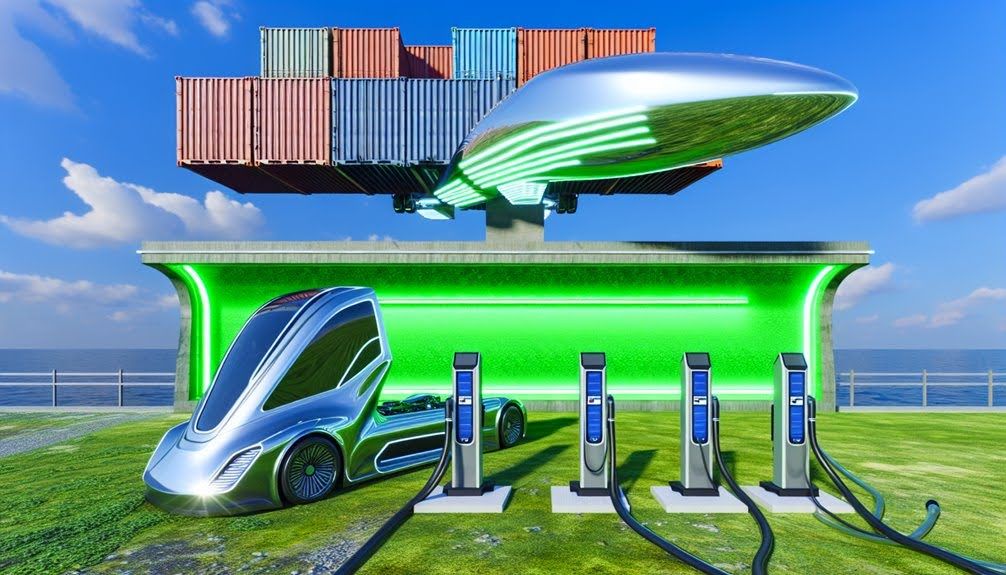While traditional gas stations fade into the background, electric vehicle charging stations are emerging as essential hubs for the future of transportation. You’re likely aware of how innovations in trucking services are streamlining logistics, but have you considered the impact of intermodal driver jobs in this evolving landscape? As the industry adapts to new technologies and environmental concerns, the implications for both businesses and job seekers are profound. What might this mean for your role in the transportation ecosystem as it transforms?

The Rise of Electric Vehicle Charging Stations
The surge in electric vehicle (EV) charging stations is revolutionizing the transportation landscape, making it easier for consumers to embrace sustainable driving. As charging infrastructure expands, you’ll find it increasingly convenient to recharge your vehicle, reducing range anxiety and promoting EV adoption.
Recent studies indicate that a robust network of charging stations can boost EV sales by up to 30%. This growth not only supports individual drivers but also plays a crucial role in advancing sustainable mobility initiatives.
Innovations in Trucking Services
Innovations in trucking services are transforming the logistics industry, enhancing efficiency and sustainability. One of the most significant advancements is the integration of autonomous trucks. These vehicles can reduce labor costs and improve delivery times while minimizing human error. According to studies, autonomous trucks could potentially decrease operational costs by up to 30%.
Additionally, advanced fleet management systems are becoming essential tools for optimizing routes and monitoring vehicle performance in real-time. By leveraging big data analytics, you can enhance decision-making processes, reduce fuel consumption, and improve overall fleet productivity.
As these technologies continue to evolve, they’ll reshape the trucking landscape, making it more efficient and environmentally friendly, ultimately benefiting both businesses and consumers alike.
Intermodal Transportation Explained
As the logistics industry evolves, intermodal transportation is gaining traction as a strategic method for moving goods efficiently across multiple modes of transport. This approach leverages rail connections alongside trucking and maritime shipping to optimize freight logistics, reducing transit times and costs. By combining the strengths of each transport mode, intermodal systems enhance the reliability and flexibility of supply chains.
Data indicates that utilizing rail connections can lower greenhouse gas emissions by up to 45% compared to road-only transport, highlighting sustainability benefits. Moreover, the growing demand for expedited delivery services drives investments in intermodal infrastructure, ensuring that businesses can adapt to shifting market requirements while maintaining efficiency in their operations. Understanding these dynamics is crucial for staying competitive in today’s logistics landscape.
Environmental Impact of New Technologies
With the rise of new transportation technologies, their environmental impact has become a focal point for industry leaders and policymakers alike. Electric vehicles (EVs) are often heralded as a solution to reduce the carbon footprint of the transportation sector. Research shows that when charged with renewable energy, EVs can significantly lower greenhouse gas emissions.
However, the production and disposal of batteries present challenges that must be addressed through sustainable practices. Moreover, the expansion of charging infrastructure can lead to increased energy consumption, necessitating a careful balance between convenience and environmental responsibility.
As you consider future investments or career paths, understanding these dynamics will be crucial to navigating the evolving landscape of sustainable transportation technologies.
Career Opportunities in Transportation
In the coming years, the transportation sector is poised to transform dramatically, creating a wealth of career opportunities across various fields. According to the Bureau of Labor Statistics, job growth in transportation and logistics is expected to rise by 6% through 2030, driven by advancements in electric vehicles and automation. Positions such as electric vehicle technicians, logistics coordinators, and intermodal drivers will see increased demand. Additionally, the salary potential in these roles is promising; for instance, intermodal drivers can earn upwards of $70,000 annually.
Conclusion
As the future of transportation unfolds, you’re witnessing a pivotal shift akin to the Industrial Revolution, where innovation fuels progress and opportunity. The surge in electric vehicle charging station, cutting-edge trucking services, and intermodal roles not only enhances efficiency but also champions sustainability. By embracing these changes, you’re not just navigating a career path; you’re contributing to a cleaner, smarter world. The road ahead is bright, and your role in this transformation is invaluable.

Founder Dinis Guarda
IntelligentHQ Your New Business Network.
IntelligentHQ is a Business network and an expert source for finance, capital markets and intelligence for thousands of global business professionals, startups, and companies.
We exist at the point of intersection between technology, social media, finance and innovation.
IntelligentHQ leverages innovation and scale of social digital technology, analytics, news, and distribution to create an unparalleled, full digital medium and social business networks spectrum.
IntelligentHQ is working hard, to become a trusted, and indispensable source of business news and analytics, within financial services and its associated supply chains and ecosystems











